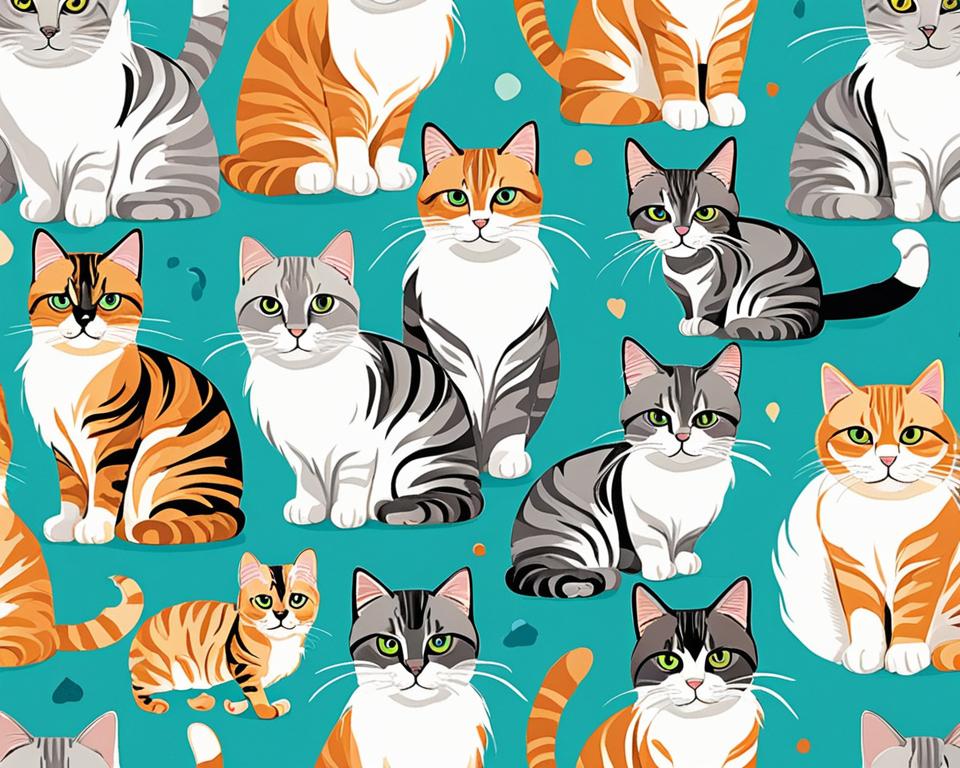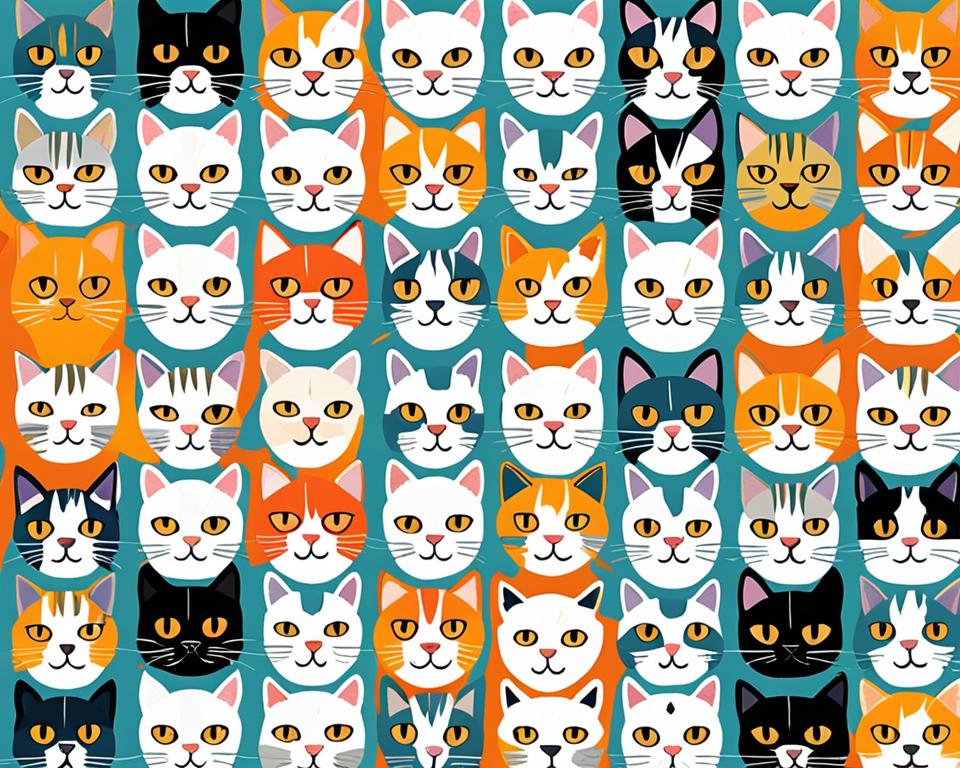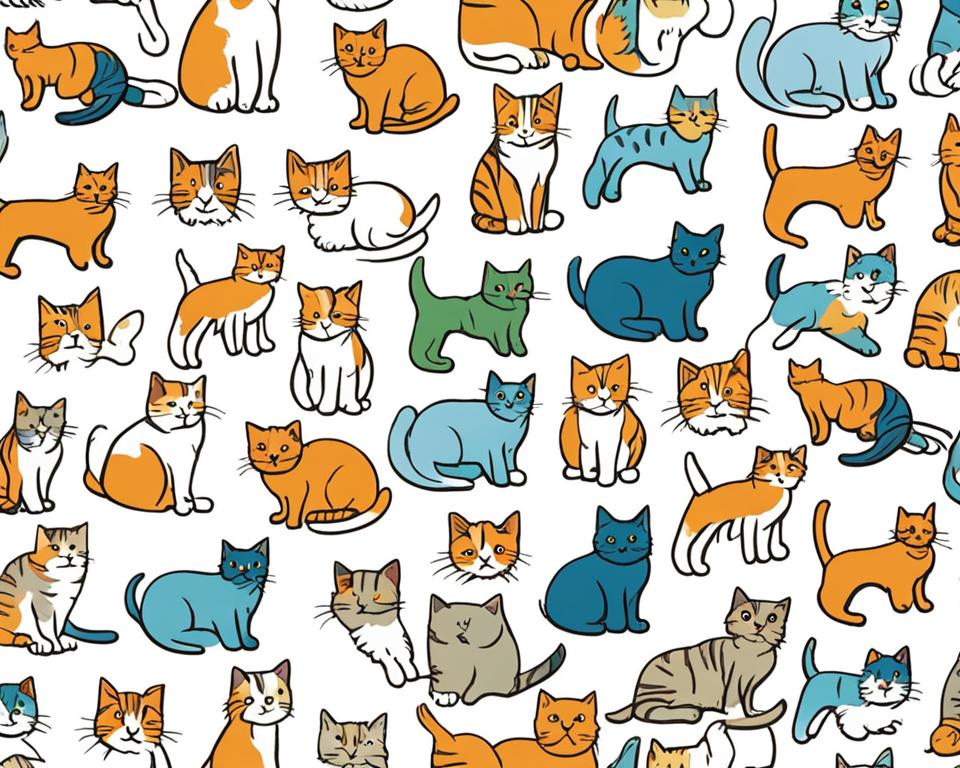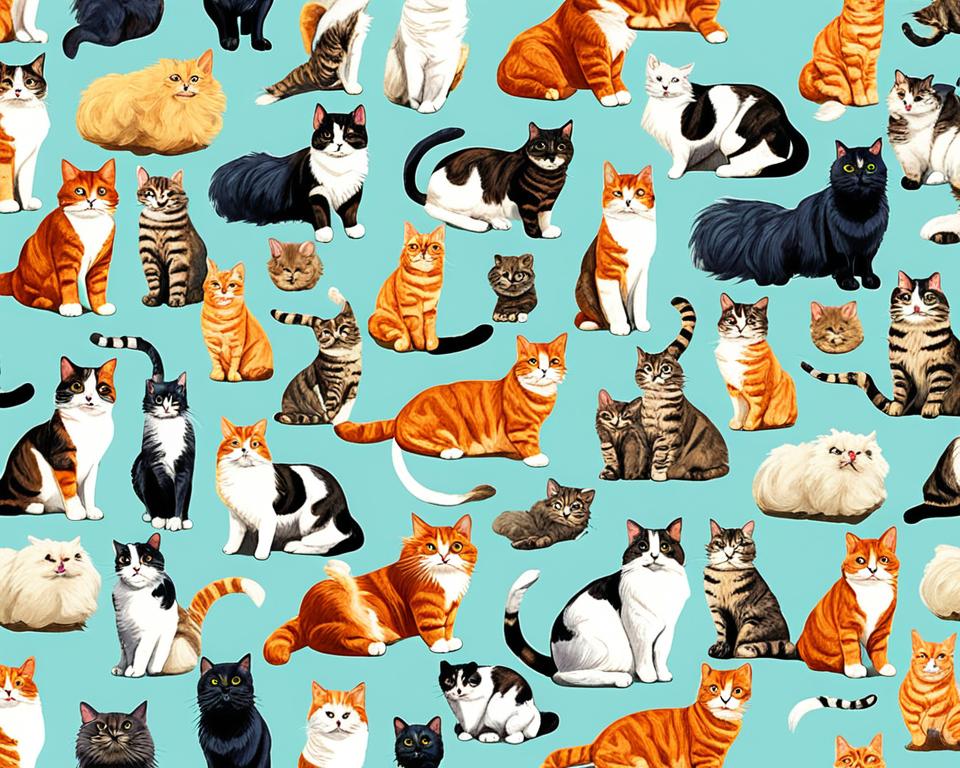I’m excited to explore cat breeds with you! Did you know over 42 million American homes have a cat? With more than 76 million cats in the U.S., many families love having more than one cat.
From the elegant Siamese to the playful Devon Rex, there’s a wide variety of cats. Whether you like the big Maine Coon or the small Singapura, there’s a cat for every lover.
Let’s look at the different types of domestic cats. Some need little grooming, while others require more to keep their fur looking great. Join me as we explore the world of cat breeds. You might find your perfect pet!
Introduction to the World of Cat Breeds
Cat breeding has a long history that goes back thousands of years. I find it amazing how diverse pedigreed cats are today. From the striking blue eyes of Siamese cats to the unique spotted coats of Bengal cats, each breed has its own charm.
The History of Cat Breeding
Cats have been domesticated for millennia, showing a strong bond between humans and cats. Over time, selective breeding has led to over 100 recognized cat breeds. This variety includes both natural and man-made breeds, each with unique characteristics.
Understanding Cat Breed Classifications
Cats are classified based on their coat length, body shape, and appearance. For example, Persian cats have long, luxurious coats and flat faces. Sphynx cats are hairless, and Maine Coons are large, often over 20 pounds.
The Importance of Breed Recognition
Breed recognition is key to maintaining standards and valuing each cat type’s unique qualities. It helps people understand the traits, care needs, and health concerns of different breeds. For instance, Bengal cats are energetic and adventurous, while British Shorthairs are calm and reserved.
| Breed | Weight Range (lbs) | Characteristics |
|---|---|---|
| Bengal | 8-18 | Energetic, affectionate, adventurous |
| British Shorthair | 9-18 | Easygoing, calm, devoted |
| Maine Coon | 10-25 | Playful, adaptable, friendly |
| Ragdoll | 10-20 | Loving, laid-back, sweet-natured |
Knowing these differences helps cat lovers choose a feline that fits their lifestyle and preferences.
Popular Cat Breeds and Their Unique Characteristics

I love learning about the different cat breeds. Each one has its own special traits. These come from its unique ancestry and genealogy. Let’s look at some popular breeds that have won the hearts of cat lovers in the United States.
The Ragdoll breed is at the top of the Cat Fanciers’ Association’s list for four years. These big cats weigh 10-20 pounds and can live up to 25 years. They are known for being calm and loving to be held.
Maine Coons are the biggest pedigree cats. They weigh 9-20 pounds and are 10-16 inches tall. With 75 color options, these friendly cats are truly a wonder to see.
If you want an active cat, the Devon Rex might be right for you. These cats weigh 5-9 pounds and can live 14-17 years. They have big ears and a wavy coat, making them look unique.
- Persian cats: Known for their luxurious coats and sweet personalities
- Siamese: Talkative and form strong bonds with their owners
- British Shorthair: Sturdy cats with a remarkable 12-20 year lifespan
When picking a cat, think about your lifestyle and where you live. Some cats, like the energetic Bengal, need lots of activity. Others, like the calm Exotic Shorthair, prefer a quieter life. Each cat has its own personality, shaped by its breed and experiences.
Choosing the Right Cat Breed for Your Lifestyle

When I want to add a cat to my family, I think about how they fit my life. There are over 100 types of domestic cats. It’s important to pick the right one.
Factors to Consider When Selecting a Cat Breed
I consider my time for pet care, my home, and how I like to groom. Some cats need more attention than others. For example, Siamese cats love to play, while British Shorthairs are more calm.
Matching Cat Breeds to Different Living Situations
For small spaces, I suggest the American Curl or Russian Blue. They fit well in apartments. If I have a big house, the Maine Coon could be perfect. It’s big and has a fluffy tail.
Health Considerations for Various Cat Breeds
Health is a big factor for me. Purebred cats might face more health issues than mixed breeds. If you have allergies, the Devon Rex is a good choice because it’s hypoallergenic.
| Breed | Personality | Grooming Needs | Space Requirements |
|---|---|---|---|
| Persian | Calm, gentle | High (long-haired) | Moderate |
| Siamese | Vocal, active | Low (short-haired) | High (needs play space) |
| Maine Coon | Friendly, playful | Moderate (medium-haired) | High (large breed) |
| Scottish Fold | Outgoing, low-maintenance | Low to moderate | Moderate |
Choosing a cat is a big decision. Some cats can live up to 20 years. So, I take my time to find the best cat for me.
Cat Breeds: From Affectionate Companions to Playful Spirits

I’ve always been fascinated by the wide range of feline varieties. From cuddly companions to energetic playmates, cats offer a spectrum of personalities. Let’s dive into some popular breeds that showcase the diverse world of our feline friends.
The Maine Coon, a gentle giant of cat ancestry, can weigh up to 20 pounds. These fluffy felines are known for their dog-like loyalty and need regular grooming to maintain their magnificent coats. On the other end of the size spectrum, we have the Abyssinian. These medium-sized cats sport a unique ticked coat reminiscent of wild cats in North America.
For those seeking an affectionate lap cat, the Ragdoll is a perfect choice. These calm and adaptable cats thrive in various environments and get along well with children and other pets. If you’re looking for a more playful companion, consider the Japanese Bobtail. Known for their friendly nature, these cats love to be involved in daily activities.
| Breed | Personality Trait | Special Characteristic |
|---|---|---|
| Maine Coon | Loyal | Largest domestic cat breed |
| Abyssinian | Playful | Ticked coat pattern |
| Ragdoll | Affectionate | Relaxed temperament |
| Japanese Bobtail | Friendly | Short, pom-pom-like tail |
| Bengal | Energetic | Leopard-like spots |
| Turkish Angora | Playful and intelligent | Long, soft fur |
The Bengal breed stands out with its wild appearance and high energy levels. These cats are curious and always on the move, perfect for active households. For a unique blend of playfulness and intelligence, the Turkish Angora is an excellent choice. They enjoy participating in their owners’ activities and some even like swimming!
Whether you prefer a cuddly companion or an energetic playmate, there’s a cat breed to suit every lifestyle. The rich diversity of feline varieties ensures that every cat lover can find their perfect match.
Grooming and Care Requirements for Different Cat Breeds
As a cat lover, I’ve learned that grooming needs vary among purebred cats. It’s key to know these differences for their health and looks. Let’s look at the grooming needs of various cat breeds, focusing on their unique backgrounds.
Long-haired breeds like Persians, Himalayans, and Norwegian Forest Cats need daily care. Their thick fur must be brushed often to avoid mats and reduce hairballs. Persians, for example, need brushing every day to stop tangles.
Short-haired breeds such as Siamese and Bengals are simpler to care for. A weekly brush keeps their coats shiny and healthy. Some breeds, like the Turkish Van, have coats that resist water, so they need less grooming.
Shedding affects grooming needs too. Ragdolls shed more in spring and fall, so they need more brushing then. But breeds like Devon Rex and Abyssinians shed less.
| Breed | Coat Type | Grooming Frequency |
|---|---|---|
| Persian | Long | Daily |
| Siamese | Short | Weekly |
| Maine Coon | Long | 2-3 times/week |
| Scottish Fold | Short/Long | 2-3 times/week |
Grooming isn’t just about fur. All cats need regular dental care, no matter their breed. By understanding and meeting each breed’s grooming needs, we can keep our cats healthy and happy.
Popular Cat Breeds: A Closer Look at Top Choices
I’ve always been fascinated by the world of cat pedigrees. The Cat Fanciers’ Association (CFA) lists 45 breeds, each with its own charm. Let’s look at some top feline breeds loved by cat fans in the U.S.
Ragdolls are top in popularity for five years straight. They’re big, with striking blue eyes, and love to cuddle. Maine Coons are right behind, being the biggest cats at home, weighing 20-25 pounds.
Persians are now in third place, loved for their soft coats and kind hearts. Devon Rex cats have dropped to fifth place but still have many fans.
| Rank | Breed | Notable Characteristics |
|---|---|---|
| 1 | Ragdoll | Blue eyes, affectionate nature |
| 2 | Maine Coon | Large size, friendly disposition |
| 3 | Persian | Luxurious coat, sweet personality |
| 4 | Exotic | Flat face, plush coat |
| 5 | Devon Rex | Wavy coat, playful nature |
The Sphynx, known for being hairless, is now tenth in popularity. The Russian Blue is still a hit for its lively spirit. The Bengal, new to the CFA in 2018, quickly rose to the top 15, loved for its wild look.
Whether you like the cuddly Ragdoll or the exotic Bengal, there’s a cat breed for everyone. The world of cat pedigrees is always changing, offering many exciting feline friends for cat lovers.
The Impact of Cat Breeds on Pet Ownership
Cat lineages have changed how we think about pet ownership. In the last 150 years, over 70 cat breeds have been recognized. This means there’s a cat for every kind of owner. In the USA, 16-18% of pet cats are purebreds, while in the UK, it’s 8-11%.
Purebred cats can be more expensive but they have special traits and looks. For example, Exotic Shorthairs are very popular in the USA. Mixed-breed cats, which are over 90% of domestic cats, offer unique traits and are often cheaper. This variety lets owners find the perfect cat for their lifestyle and tastes.
The popularity of certain breeds affects adoption rates and breeding. Persian cats were very popular in the USA from 1985-1995 but now they’re less popular. Knowing about different cat types helps owners make better choices. Whether you want a high-energy Abyssinian or a calm breed for a family with kids, there’s a cat for you.

